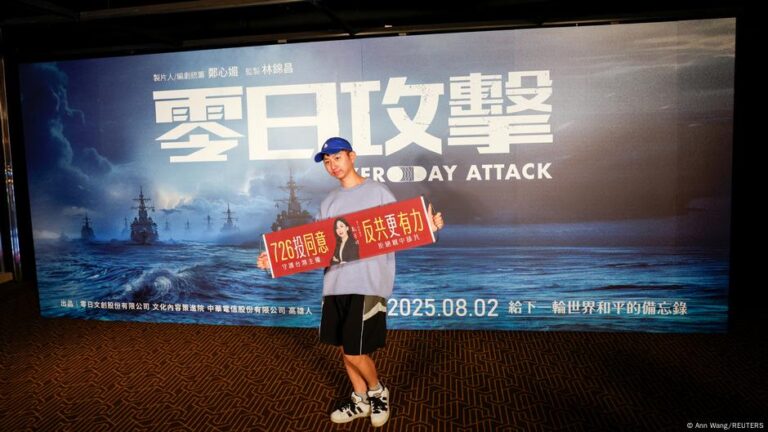A new Taiwanese series about a fictional Chinese invasion has sparked heated debate after its Saturday premiere topped drama rankings on public TV and multiple streaming platforms.
The ten-episode drama titled “Zero Day Attack” is set in 2028, imagining China using a missing warplane as a pretext to launch a blockade when a newly elected Taiwanese president is about to take office.
Some viewers praised the show for helping “every Taiwanese understand how the CCP [Chinese Communist Party] infiltrates us,” while others accused it of “selling a sense of national doom.”
Taiwan is a self-governing democracy that Beijing claims is part of China, with the CCP vowing to “reunify” with the mainland by using force if necessary.
For years, Taiwanese filmmakers largely avoided cross-strait conflict plots to avoid jeopardizing access to China’s lucrative media market.
Yu-Hui Tai, an associate professor of political economics of communication at National Yang Ming Chiao Tung University in Taiwan, said a trend is emerging where imagining a Chinese invasion is no longer taboo.
“[The trend] reflects how we’ve broken the spiral of silence,” she told DW.
“It’s gone from something we didn’t want to talk about to something we can now imagine and even simulate.”
Taiwanese creatives inspired by Ukraine
“Witnessing the severity of the war in Ukraine, I felt that if we didn’t address this topic now, there might never be another chance,” showrunner and screenwriter Cheng Hsin-mei told DW, adding that production on Zero Day Attack began in late 2022, the same year Russia invaded Ukraine.
Taiwan has emerged as one of the globe’s most contentious flashpoints as China intensifies its military presence in the region, and carries out regular exercises around the island.
While most democratic countries including the United States — Taiwan’s largest security backer — adhere to the “One-China Policy,” which means they do not officially recognize Taiwan as a sovereign state, they oppose any unilateral attempts by either side to change the current status quo.
In May, Zero-Day Attack premiered at the Copenhagen Democracy Summit in Denmark, where it received a standing ovation. The series is also set to premiere at a debut event in Washington, DC in September and launch on a Japanese streaming platform in mid‑August.
Series sparks controversy
But before the series officially aired, its trailer already sparked controversy domestically.
With about half the series’ budget coming from government subsidies, Taiwan’s main opposition Kuomintang (KMT) accused the ruling Democratic Progressive Party (DPP) of using public funds to promote a “sense of national doom” — a charge echoed by many KMT supporters.
Cheng responded that government subsidies are common for most local film and TV projects, arguing that “the sense of national doom” comes from “the reality that a powerful authoritarian regime continually warns it will not abandon the use of force against Taiwan.”
Unlike typical war dramas filled with epic battle scenes, Zero Day Attack focuses on Taiwan’s internal struggles amid a potential war, portraying the political divisions and chaos on the island.
The concept was developed through research and consultation with national security experts, Cheng said, as “modern warfare relies on various forms of infiltration to sow fear or prompt surrender.”
China-focused games hit the market
Like the TV series, games that aim to bring about awareness and knowledge of China’s political infiltration strategies have also emerged on the market.
Earlier this year, the board game 2045 was officially released after a successful crowdfunding campaign. The game simulates a Chinese military attack in 2045, following which Taiwan divides into six different forces including self-defense units and pro-unification groups.
Another board game even turned the story idea into a mobile game called Reversed Front. It created a virtual “Oriental Continent” that allows players to infiltrate the Chinese Communist Party from Taiwan, Hong Kong, or other surrounding areas.
In June, Hong Kong authorities banned the mobile game for allegedly “violating the National Security Law.” The ban, however, only fueled a surge in downloads.
“We aim to present a realistic picture of the political landscape in East Asia,” said Johnny, the spokesperson of Reversed Front, who used a pseudonym given the sensitivity of the topic.
“Regardless of the threat or methods of infiltration from Beijing, we hope Taiwan can learn how to take countermeasures,” he told DW.
The emotional toll of imagining an invasion
However, concerns about the psychological impact of these works have grown, with critics warning they could increase public anxiety.
A Taiwanese board game store told DW that while most customers visit to unwind and relax, playing 2045 can leave some feeling emotionally strained or under pressure.
“There will inevitably be anxiety,” said Tammy Lin, a distinguished professor at Taiwan’s National Chengchi University who studies digital games and media psychology.
“For Taiwan, this is a nightmare‑level topic that people would rather not mention or confront,” she told DW.
Tai, the professor for political economy of communication, said it is natural for the films and games to evoke a spectrum of emotions, given Taiwan’s deep partisan divides over cross‑strait relations.
“How we facilitate dialogue among these differing emotions instead of letting them clash is a real test of Taiwanese wisdom,” she said.
Tai also noted that Beijing is likely to see these TV shows and games as Taiwanese public sentiment drifting further away from China, which could prompt the Chinese government to “intensify its ideological efforts.”
China’s Defense Ministry has already criticized Zero Day Attack, calling it a politically motivated production aimed at “forcing compatriots on both sides of the Taiwan Strait into conflict and to harm and ruin one another.”
“Division is a fertile ground for information warfare and fake news,” Tai said, “The question is: do we want to create fear or foster rational dialogue?”
Edited by: Wesley Rahn


